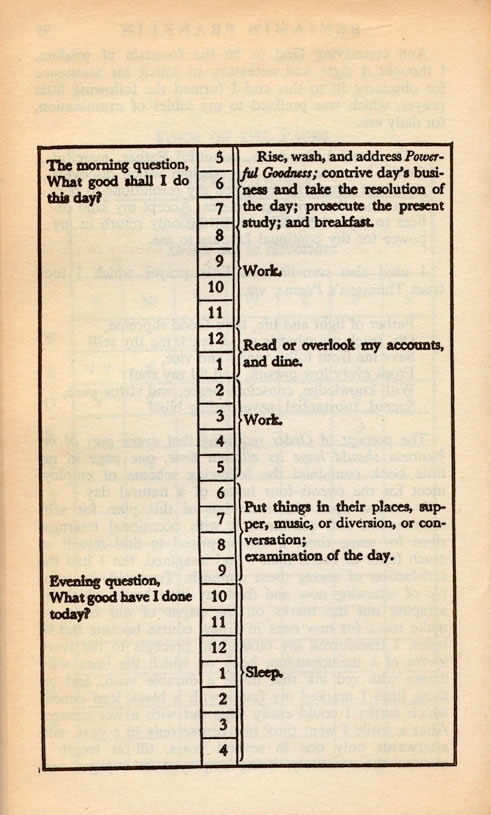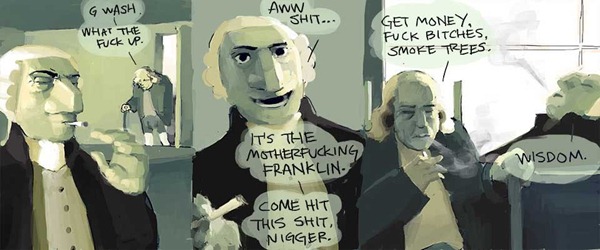Ben Franklin’s Schedule
Of the Founding Fathers of the United States, my favourite is Ben Franklin. I’m a fan (and attempted emulator) of polymaths, and Ben was a supreme one, having been a writer, printer, political theorist and practitioner, scientist and engineer, soldier and statesman.
What better way to mark the beginning of what’s going to be a busy week for Yours Truly than by posting Ben Franklin’s daily schedule? Here it is, complete with his morning and evening questions, which we’d all do well to ask ourselves daily:


Some folks I know were discussing what he meant by “Addressing Powerful Goodness”, which he does at the start of the day. Someone supposed that it meant a morning constitutional, another thought it might be prayer and a wag suggested it might be “chopping the morning wood,” in that way that wags are wont to do.
Fans of the movie Dazed and Confused might prefer the notion that Ben Franklin liked to drop by George Washington’s place to smoke his fine weed (see this scene), and just for you, here’s a comic depicting just that, with both gentlemen talkin’ gangsta (be forewarned, it’s a little sweary):


Recent Posts
Sunday picdump for March 16, 2025
Another Sunday, another “picdump!” Here are 200+ memes, pictures, and cartoons floating around the internet…
TV caption of the day
A Swedish TV program labelled Vladimir Putin as “President USA.” My thoughts on this:
[Update] A true is friend is someone who would hide you. Canada has been that friend to the U.S.
[ The original version of this article is incorrect, so I’m substituting its content with…
Notes for the kakistocracy, 2025-03-10: Even Peter Zeihan says we might be the USSA, the danger of one-party states, JD Vance’s much cooler cousin, and why we need to be bold
A reminder: kakistocracy means “a state or society governed by its least suitable or competent…
The better Vance: JD Vance’s cousin Nate was a volunteer soldier in a Ukrainian battalion
Le Figaro, a daily newspaper in France that’s been around since 1826, has published an…
Sunday picdump for March 9, 2025
Another Sunday, another “picdump!” Here are 200+ memes, pictures, and cartoons floating around the internet…
View Comments
Wow, thanks for introducing to me the concept of a polymath. For the longest time I've been sad over being a "jack of all trades and master of none". Yes, I do get that a polymath isn't a "generalist". Still, I'm heartened to know that two people I look up to, you and Mr. Franklin, are exemplaries of polymaths :)
Johnny: Thanks for the kind words!
If ever you feel down about not having a single specialization, remember Robert Heinlein's words:
The powerful goodness is a reference to the deity. Franklin, like many of the founding fathers, was a deist. Deists didn't consider god a personal creation, but rather a manifestation of the forces of the universe. Their religious creed was much closer to atheism than most modern religions.
I suspect he did believe in bible-based God, but like most other thinking intelligent discerning persons, he didn't buy into all the BS associated with the Christian subculture of the day - the the silly traditions, rituals, rules and convictions and dogmatic doctrine.
Instead of abandoning his faith in God, he likely transcended the silly humanness of organized and contrived religion and focused on God Himself in humility & reverence.